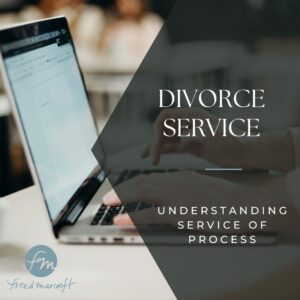How to Serve Divorce Papers
 To initiate a divorce in Connecticut, one of the first things the Plaintiff must do is serve divorce papers on the other party. Serving the divorce papers is a crucial step in initiating the divorce process with the Court. This step, known as “service of process,” ensures that both parties are properly notified about the divorce proceedings. Understanding how the service of process works in Connecticut divorces is essential to a smooth and legally valid divorce.
To initiate a divorce in Connecticut, one of the first things the Plaintiff must do is serve divorce papers on the other party. Serving the divorce papers is a crucial step in initiating the divorce process with the Court. This step, known as “service of process,” ensures that both parties are properly notified about the divorce proceedings. Understanding how the service of process works in Connecticut divorces is essential to a smooth and legally valid divorce.
What Does It Mean to Serve Divorce Papers?
Service, or “service of process,” is how a Plaintiff in a lawsuit formally lets the Defendant know about the case. For example, a divorce, or dissolution of marriage, is a formal, legal process. As with any other civil lawsuit in Connecticut, there are service requirements.
What Papers Are Served in a CT Divorce?
At a minimum, in a Connecticut divorce, you must serve the Defendant with a:
If you and your spouse have children, you must also serve an Affidavit Concerning Children. In some cases, your attorney will also recommend serving other documents, such as pendente lite motions.
Read: What Does Pendente Lite Mean?
Read: What Are the Automatic Orders in a Connecticut Divorce?
How Are Divorce Papers Served?
Divorces are generally served either directly to the recipient (called “in hand” service) or left at their usual place of residence (called “abode” service). Both are proper. However, depending on the circumstances, the law may allow other service methods, such as certified mail or publication in a newspaper.
Can I Serve Divorce Papers Myself?
Generally speaking, no. State marshals are sworn peace officers authorized by the State of Connecticut to serve civil process, including dissolution of marriage.
Who Can Serve Divorce Papers?
State marshals are the most common process servers. That said, constables are also able to serve divorce papers.
Can I Serve Divorce Papers By Mail?
Generally speaking, no. There are some exceptions when a marshal can serve someone via certified mail. For example, if your spouse lives outside of Connecticut and you know their address, you can request that the Court sign an “Order of Notice.” The Court has the authority to allow a Connecticut marshal to serve your out-of-state spouse via certified mail.
Acceptance or Waiver of Service
Your spouse can also agree to waive service, eliminating the need for a marshal. They do so by completing a Certification of Waiver of Service of Process under oath and filing it with the Court along with their Appearance. In some cases, your divorce attorney will accept service on your behalf.
Read: What’s an “Appearance” in a Divorce?
Service in Mediation or Collaborative Divorce
In amicable divorces like mediation and collaborative divorce, it’s common for the parties to hold off on initiating the divorce lawsuit until after they’ve reached an agreement. That means most negotiations happen before the parties file — or serve — the divorce papers. Although there’s still technically a “Plaintiff” and a “Defendant” even in amicable divorces, it’s common for the Defendant to waive service.
Read: What Is a Non-Adversarial Divorce?
Read: ADR & Divorce
How to Serve Divorce Papers Out of State
Following a Plaintiff’s Motion for an Order of Notice, the Court has the authority to allow a Connecticut state marshal to serve the out-of-state Defendant via certified mail. Alternatively, the Court also has the authority to order a marshal in the state where the Defendant lives to complete service.
If, after making reasonable efforts, the Plaintiff cannot find the out-of-state Defendant’s address, the Court may order “service by publication.”
What Happens After You Serve Your Spouse With Divorce Papers?
First, the state marshal provides you with a “Return of Service.” The Return of Service proves that the divorce papers were correctly served.
Filing Your Divorce
You (or your attorney) file the Return of Service, the divorce papers, and the filing fee with the Court.
Read: How to File for Divorce
Read: What CT Family Courthouse Do I File My Divorce In?
Timeframe for Service
The State Marshal must complete service at least 12 days before the Return Date. Then, the court clerk must receive the original Summons, Complaint, Notice of Automatic Court Orders, Return of Service, and filing fee at least six days before the Return Date.
Read: What Is the Return Date in a Connecticut Divorce?
Served with Divorce Papers, Now What?
Assuming you do not contest the Connecticut court’s jurisdiction over your case, youCourtorney will file an appearance with the Court on your behalf and may also file an answer or a cross-complaint. A cross-complaint has a couple of main benefits. First, it allows you to plead (in other words, as the Court for) what you seek. In addition, a cross-complaint allows the divorce to continue even if your spouse decides to withdraw their complaint.
What Happens if Service Didn’t Happen or Was Incorrect?
This is quite fact specific, so consult an attorney for advice about your situation. Generally speaking, a divorce can’t go forward without proper service or a proper waiver of service.
Next Steps
If you have additional questions about how all this might work in your situation, please contact us.








